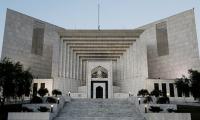ISLAMABAD: The abolishing of Broadening of Tax Base (BTB) Zones by FBR have raised important questions how the broadening of narrowed base will be done by overburdened operational wings whose attentions were stuck up for materialising an ambitious tax collection target of Rs5,503 billion.
The FBR’s BTB zones were established with approval of Board in Council so the question arises if the FBR got any approval from any competent forum to abolish BTB zones.
Secondly, the BTB undertook important task by undertaking plaza mapping in important metropolitans, collected data from key housing societies and built up hundreds of thousands of potential cases where information was collected in such shape that could be converted into taxability. Even FBR former chairman Tariq Pasha publicly praised the work done by the BTB Wing and had stated that the amnesty scheme announced in May/June 2018 got success because of spadework done by the BTB.
On other hand, the number of return filers increased from 1.6 to 2.5 million so the BTB helped create an environment where non-filers were forced to come into tax system. Now the question arises how the crucial information collected by the BTB Zones will not be wasted and will be ensured that it will be utilised in such a shape that can result into broadening of tax base.
Thirdly, the FBR took decision to establish BTB authority through an act of Parliament in 2017 after experiencing that the task of broadening tax base could not be done by operational and policy wings of Inland Revenue Service (IRS). What has changed now that the field formations would be capable enough to broaden the tax base and materialise the revenue collection simultaneously when there will be more focus on revenue collection under the IMF loan agreement.
It was the plan of the FBR to expand scope and coverage of BTB Zones all over the country in phased manner but this whole mechanism was packed down with this assumption that the field formation would continue this important task.
The BTB Zones were assigned Benami task and this mechanism of broadening tax base was abolished in totality. One top official of FBR defended the Board’s decision to do away with BTB Zones arguing that it was done to achieve efficiency. The field working experience of last 25 to 30 years shows that such standalone mechanism could perform only in the presence of dynamic and outclass leadership so the FBR’s top management took decision to assign this task to all field formations including Large Taxpayers Units (LTUs), Regional Taxpayer Offices (RTOs) and other subordinate offices to broaden the tax base instead of shifting responsibilities on shoulders of the BTB zones.
Finally, the questions arises as BTB zones gathered key information about potential non-filers, who is owner of this important data. There is need to place a system to manage and utilise this precious data in order to expand the narrowed tax base. If this data is not properly utilised it will be negligence on part of the tax collection machinery.






